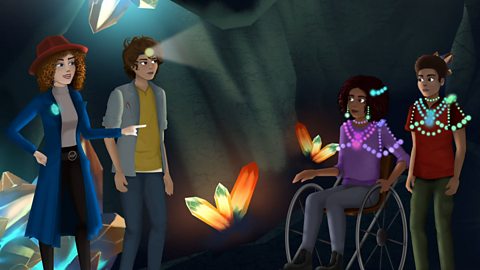NARRATION:Back in the deepest, darkest depths of time, there lived a great mathemagician called Hypatia. Numbers fell under her spell one by one. With them, Hypatia could do anything. Now Hypatia is looking for people to share her powers with. She has forged a mathematical maze. Only true mathemagicians can solve the puzzles and find their way out. Join two young explorers, Oliviaand Hassan, to solve the puzzles, escape the maze and become the greatest mathemagicians of all time.
Factors, multiples and primes.
OLIVIA:Hypatia said, follow the shadows.
HASSAN:But where are the shadows?
OLIVIA:We'll never find her now. Woah!
HASSAN:Uh-oh.
HYPATIA:Looking for me? Welcome to the desert of factors, multiples and primes. One of my favourite parts of my mathematical maze. If you are going to find your way out, you are going to have to work out what is a factor? What is a multiple? And what is a prime? Only that way will you be able to answer thisÔÇŽ What is special about the arrays of three, seven and 13?
OLIVIA:Archimedes! We've been lost in this desert for ages.
HASSAN:You've got supplies, right?
ARCHIMEDES:Oh, one or two little things, yeah.
HASSAN:Ah cookies!
ARCHIMEDES:Not so fast. We don't want to go eating everything we have in the first ten minutes now do we?
HASSAN:Don't we?
ARCHIMEDES:No. Then we'd have nothing to eat. And we can't be sure how long we'll be here.
HYPATIA:Who knows how long you'll take to solve my puzzle.
HASSAN:Hmm. True.
ARCHIMEDES:Alright, let's solve this. Multiples.
Okay, we have 21 cookies.
HASSAN:And there are three of us.
OLIVIA:Four of us?
HASSAN:Oh no.
HYPATIA:Don't worry. I'm not the cookie kind of mathmagician. I have some intense equations to be solving. I'll catch you later.
HASSAN:Ah, more cookies for me!
OLIVIA:Umm, I think not.
ARCHIMEDES:21 is a multiple of three, which means we can evenly split 21 into three portions. So that should work out fine, right Hassan?
HASSAN:Mmm.
OLIVIA:Seven times three is 21.
ARCHIMEDES:Yes, seven is a factor of 21 because you can multiply it by another number to give 21. We get seven each. We can evenly split 21 by seven and three.
Hey, Hassan! We haven't divided those up yet.
HASSAN:I just thought you know, five and seven don't divide by three, so maybe I could justÔÇŽ
OLIVIA:But five plus seven makes 12.
ARCHIMEDES:And 12 can be divided by three, so 12 is a multiple of three. We can divide 12 apples into three equal parts.
HASSAN:Okay, didn't think of that.
OLIVIA:Okay, fair. Three is a common factor of both 12 and 21.
HYPATIA:A factor is a number that divides a given number without a remainder. A number that is a factor of two or more given numbers is called a common factor of those numbers.
OLIVIA:Both 12 and 21 can be split into three equal parts, so we'll just group the green and the red apples together in one group and then share them out that way. Four for Hassan, four for Archimedes and four for Olivi- Urgh.
ARCHIMEDES:Now there are only 11 apples and 11 is a prime number. It can't be divided by three. It can only be divided by itself, and by one and nothing else.
HYPATIA:A prime number is a number only divisible by itself and one.
ARCHIMEDES:Does that mean I get all the apples? I love apples.
HASSAN:Haha. No Archimedes but nice try.
HYPATIA:Okay, enough of the apples. What about my question? What is special about the arrays of three, seven and 13?
▒ß┤í│ž│ž┤í▒Ě:▒ß│ż│żÔÇŽ
OLIVIA:Put it down, Hassan.
HASSAN:Urgh. They can only be divided equally by one and themselves.
OLIVIA:So they must be prime numbers.
HYPATIA:You have succeeded and escaped the desert of factors, multiples and primes. The portal is open! Until next time.
HASSAN:Yes!
OLIVIA:High prime number five!
HYPATIA:Ah-hah, more young mathemagicians. So, you think you too can pass through my mathematical maze? Try this puzzleÔÇŽ I am thinking of two two-digit numbers. Both of the numbers have a digit total of six. Their common factors are one, two, three, four, six and 12. What are the numbers?
Video summary
Trapped in a desert together with Archimedes, Olivia and Hassan learn what common factors, multiples, and prime numbers are.
However, before they can leave the desert, our great mathemagician Hypatia appears and asks what the similarity is between three numbers: 3, 7, 13.
After realising that these are prime numbers, Hassan and Olivia can move onto the next section of the maze.
This short animated film is from the 91╚╚▒Č Teach series, Hypatia's Mathematical Maze.
Teacher Notes
Before watching the film:
Prior to this lesson you may wish to introduce students to other relevant topics, for example:
- The times tables up to 12x12
- Multiplication and division as repeated addition and repeated subtraction
- Multiplication and division represented as arrays
During watching the film:
Depending on your lessonÔÇÖs focus, you may wish to pause the video at certain points to check for understanding, asking questions such as:
- What else is 3 a factor of?
- What multiple do 3 and 7 have in common?
- How would you describe the terms ÔÇśfactorÔÇÖ and ÔÇśmultipleÔÇÖ?
- How do you know that 3, 7 and 13 are prime?
Final question:I am thinking of two two-digit numbers. Both of the numbers have a digit total of 6. Their common factors are 1, 2, 3, 4, 6 and 12. What are the numbers?
Answer to the final question:24 and 60
Following on from the film:
- Pause the video to give time for pupils to complete HypatiaÔÇÖs final question
- Ask pupils to draw factor bugs, which are little drawings of bugs with the right number of legs and antennae to match the number of factors of a given number. The antennae are the number itself and 1. A square factor is always a tail. The class is then asked to fill in the missing factors.
- Explore common multiples by giving the pupils hundred squares. Ask them to colour the multiples of 2 and circle the multiples of 3. Some numbers have been coloured and circled. What do you notice about these numbers? (They are the multiples of 6)
- Look at some large numbers. Can any of these be prime? How do you know? E.g. 276 (not prime because itÔÇÖs even), 145 (not prime because it has a 5 at the end so itÔÇÖs in the 5 times table), 333 (not prime because it can be divided by 111), 471 (not prime because it has a digit total of 12, meaning it is in the 3 times table).
This short film is suitable for teaching maths at KS2 in England, Wales and Northern Ireland and 2nd Level in Scotland.
Adding and subtracting using mental methods. video
In a mythical temple full of obstacles, Olivia and Hassan learn simple mental maths and apply it to work out the passcode to open the door.
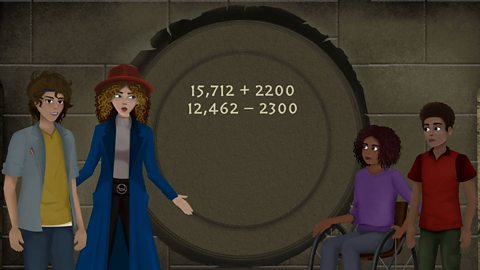
Adding and subtracting using written methods. video
Having been transported to a floating library, Olivia and Hassan's ability to solve large equations using written methods is tested.
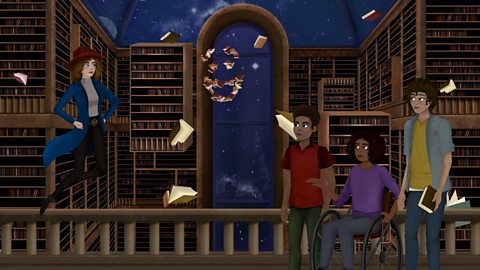
How and why we round numbers. video
Olivia and Hassan are taught how to round to the nearest 1000, 10,000, and 100,000 when a disgruntled magic carpet demands money from them.
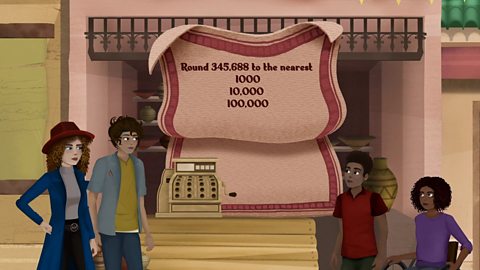
Using addition and subtraction in multi-step problems. video
Inside a giant computer created before the age of mathemagicians, Olivia and Hassan are faced with a multi-step problem to reach the labyrinthÔÇÖs next stage.
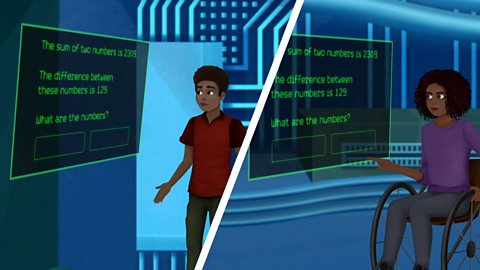
Multiplying by 10, 100 and 1000. video
When Olivia and Hassan find themselves on the roof of an enormous skyscraper they learn how to multiply by 10, 100 and 1000 and work out the number of windows on the building.
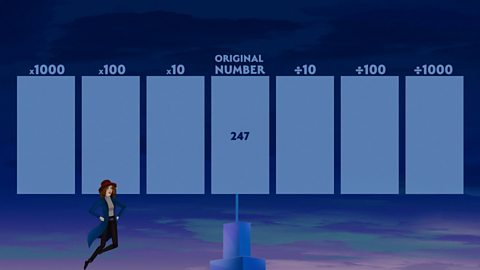
Mental multiplication. video
While exploring a jungle, Olivia and Hassan learn the true nature of square numbers as being created when two of the same number are multiplied together.
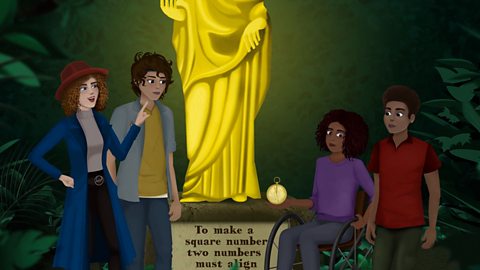
Multiplying using written methods. video
Finding themselves in space, Olivia and Hassan watch mathemagician Hypatia perform long multiplications in the sky by bending the stars.

Dividing using written methods. video
Olivia and Hassan learn how to perform long division in order to free gridlocked traffic on a bridge.
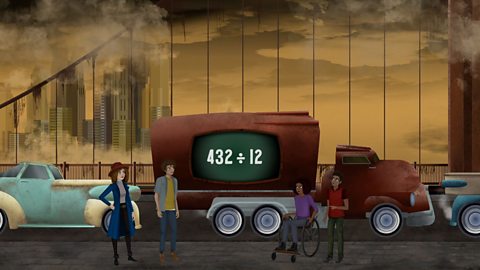
Recognising and comparing fractions. video
Olivia and Hassan are enjoying themselves in a world made out of pizza and learn how to work with numerators and denominators in fractions.
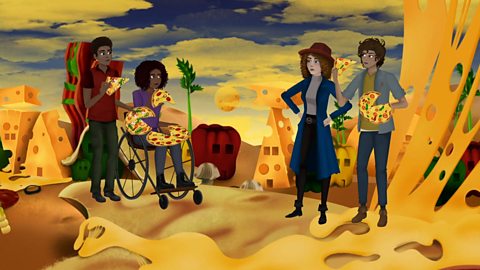
Adding and subtracting fractions. video
Amongst the ruins of an ancient city, Olivia and Hassan learn how to add and subtract fractions.
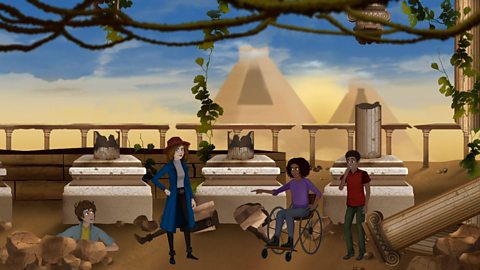
Multiplying and dividing fractions. video
In a mysterious crystal cave, Olivia and Hassan get to work dividing and multiplying fractions in order to find their way out.
